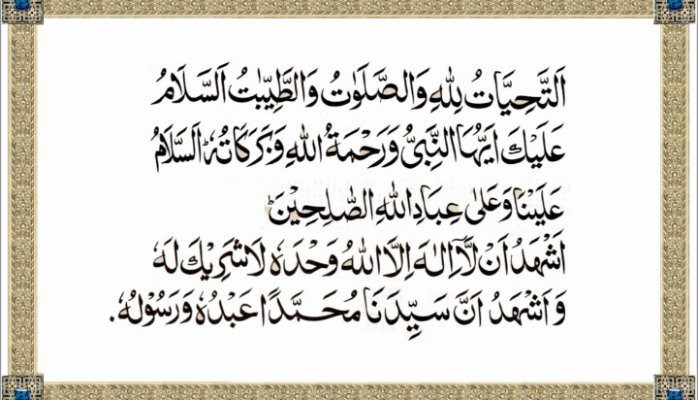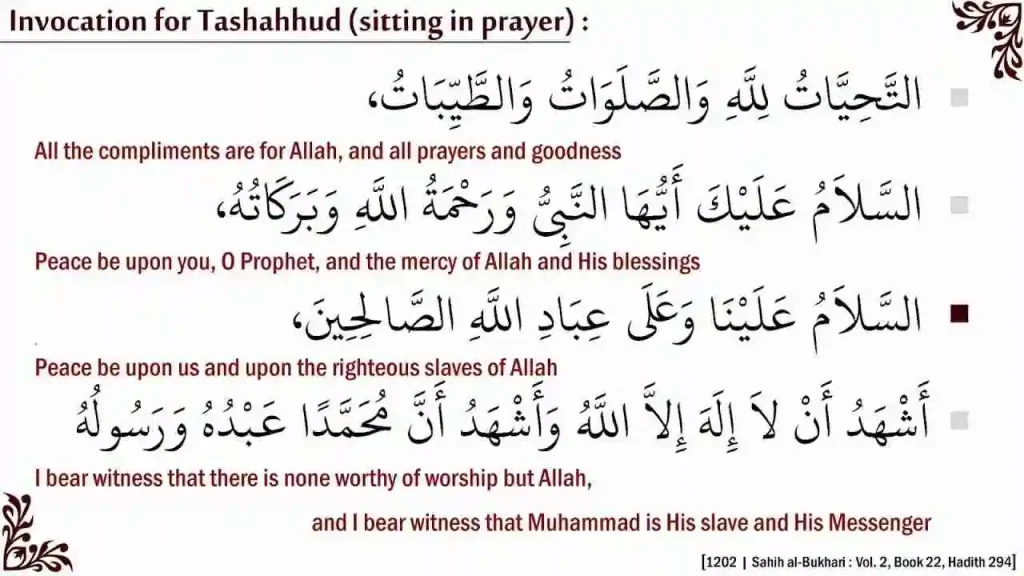
What is the full Attahiyat?
The full Attahiyat prayer in Arabic is:
“Attahiyyatu lillahi wassalawatu wattayyibatu. Assalamu ‘alayka ayyuhan nabiyyu wa rahmatullahi wa barakatuh. Assalamu ‘alayna wa ‘ala ‘ibadillahis salihin. Ashhadu alla ilaha illallahu wa ashhadu anna Muhammadan ‘abduhu wa rasuluh.”
The English translation is:
“Greetings, prayers, and good things belong to Allah. Peace be on you, O Prophet, and the mercy of Allah and His blessings. Peace be on us and the righteous servants of Allah. I bear witness that there is no god but Allah and I bear witness that Muhammad is His servant and Messenger.”
What Does Each Line of Attahiyat Mean?
The first line expresses sending greetings, prayers, and good things towards Allah.
The second line sends peace and blessings upon the Prophet Muhammad (SAW).
The third line extends the greeting of peace to oneself and all righteous servants of Allah.
The fourth line bears witness to the oneness of Allah and that Muhammad (SAW) is His final messenger.
What is the meaning of Attahiyat?
The word “Attahiyat” in Arabic means greetings or salutations. It comes from the word “hayat” meaning “life”. So Attahiyat literally means “to give life or greetings to someone”.
In the context of Islamic prayer, Attahiyat refers to all expressions of reverence, honor, prayers, and good things that are due to Allah. It establishes the concept that all forms of worship and submission belong rightfully to Allah alone.
The prayer demonstrates that the highest sentiments of love, devotion, obedience, and praise are for Allah. It reinforces a Muslim’s consciousness of Allah’s lordship during the act of worship.
Is Attahiyat a conversation?
No, Attahiyat is not a conversation per se, but rather a prayerful supplication. However, it does embody the believer communing with and consciously acknowledging the glory of Allah, as well as conveying prayers and peace upon the Prophet Muhammad (SAW).
In the first line, the worshipper sends their purest greetings, veneration, and tributes towards Allah.
The subsequent lines then offer salutations upon Prophet Muhammad (SAW), oneself, and the righteous servants of Allah. So in essence, it is the worshipper addressing both Allah and Prophet Muhammad (SAW) with utmost love and respect.
Its recital creates a profound sense of connecting with Allah’s divine presence. But being a prayer rather than dialogue, the exchange is one-sided, with the believer expressing their deepest devotion.
What is Attahiyat and salawat and dua?

Attahiyat: This refers to the opening line of the prayer which sends greetings, honor, and reverence to Allah.
Salawat: This refers specifically to the phrase “Assalamu ‘alayka ayyuhan nabiyyu wa rahmatullahi wa barakatuh” meaning “Peace be upon you, O Prophet, and the mercy of Allah and His blessings”. This is the salutation upon Prophet Muhammad (SAW).
Dua: Any supplicatory prayer or act of invocation towards Allah is called a dua. So the entirety of Attahiyat prayer embodies a beautiful dua communicating the highest sentiments of love and devotion towards Allah and His noble Messenger Muhammad (SAW).
Why is Attahiyat so special?
There are several reasons why Attahiyat holds such a special place in Islamic prayers:
1. It Affirms the Central Beliefs of Islam
Attahiyat incorporates the shahadah (testimony of faith) – the central creed that constitutes a Muslim. It emphasizes tawheed – the absolute oneness and lordship of Allah.
2. Shows Reverence to Allah and His Prophet
It allows Muslims to consciously revere both Allah and Prophet Muhammad (SAW) through beautiful words of love, honor and salutation.
3. Part of Obligatory Muslim Prayers
Attahiyat forms an essential part of the ritual prayers that are obligatory for Muslims to perform five times daily. It gives profound meaning to those worship acts.
4. Taught by the Prophet Himself
The Prophet Muhammad (SAW) directly taught his companions this prayer, giving it an immense blessing (barakah). Muslims take pride in emulating exactly how the Prophet prayed.
5. Universal Islamic Prayer
All Muslims around the world today recite this same prayer in their native languages, fostering an incredible sense of religious solidarity across all cultures and schools of thought.
Is the first tashahhud obligatory?
Yes, according to the majority of Islamic scholars, reciting the first tashahud prayer in the second and last rakat is obligatory. Tashahhud refers to the testimony and supplication part of the prayer which includes Attahiyat and Salawat upon the Prophet (SAW).
Therefore, any ritual prayer that is more than two rakats (units) must contain the sitting posture to recite tashahhud in the second rakat. Omitting it deliberately can invalidate the prayer.
Reciting tashahhud connects the various steps of prayer into one unified whole. The physical movements of prayer are paired with meaningful supplications to Allah. It fulfills an essential pillar of prayer beyond just forms.
What do you read after Tashahhud?
After completing tashahhud, it is sunnah – the tradition of the Prophet (SAW) – to send additional prayers upon him by reciting:
“Allahumma Salli ‘ala Muhammadin wa ‘ala aali Muhammadin kama salayta ‘ala Ibrahim wa ‘ala aali Ibrahim, innaka Hamid Majid. Allahumma barik ‘ala Muhammadin wa ‘ala aali Muhammadin kama barakta ‘ala Ibrahim wa ‘ala aali Ibrahim, innaka Hamid Majid.”
This means:
“O Allah, bestow Your favor upon Muhammad and the family of Muhammad as You have bestowed Your favor upon Abraham and the family of Abraham. Surely, You are Praiseworthy, Glorious. O Allah, bless Muhammad and the family of Muhammad as You have blessed Abraham and the family of Abraham. Surely, You are Praiseworthy, Glorious.”
After this, additional personal supplications can be made directly to Allah before ending the prayer with salams.
Conclusion
Attahiyat Lillahi wa Salawatu is one of the most important Islamic prayers a Muslim regularly recites in their daily worship. Known also as Tashahhud, it develops a profound, contemplative consciousness of Allah and connectivity to the Prophet Muhammad (SAW). Through its recitation in every unit of prayer, a Muslim reaffirms their devotion to Allah alone and veneration of Prophet Muhammad’s (SAW) guidance. Understanding its deep significance allows believers to truly benefit from this meaningful supplication.





